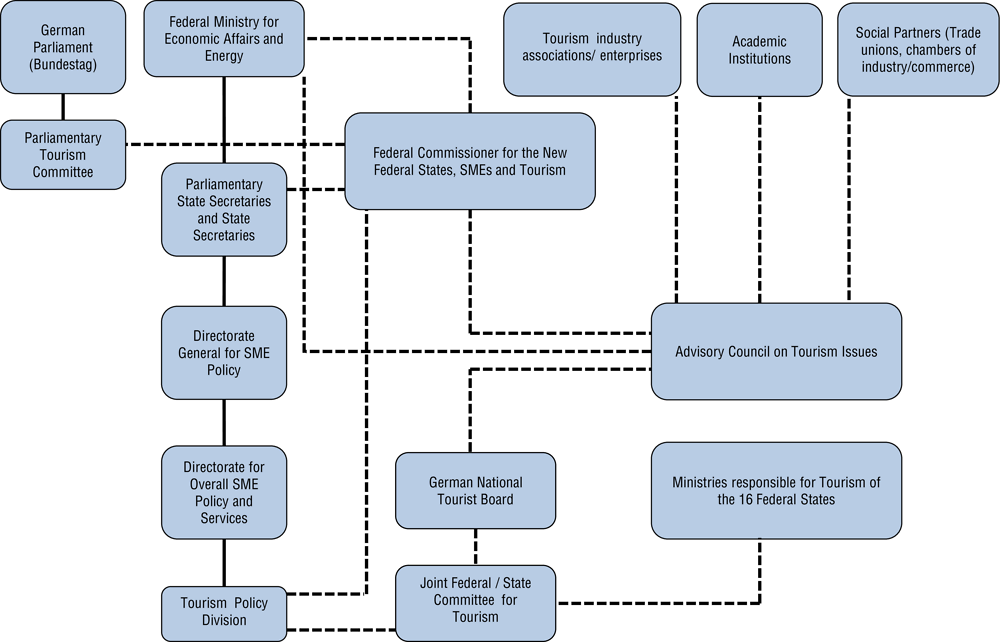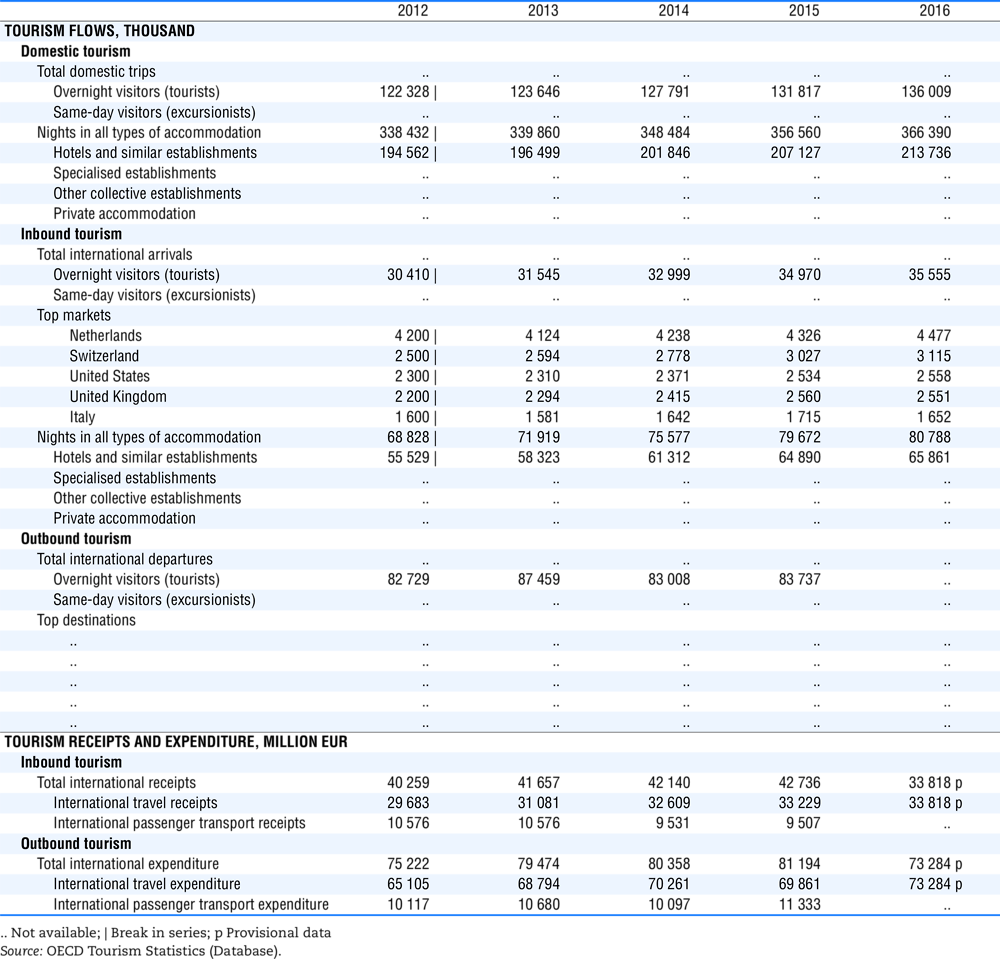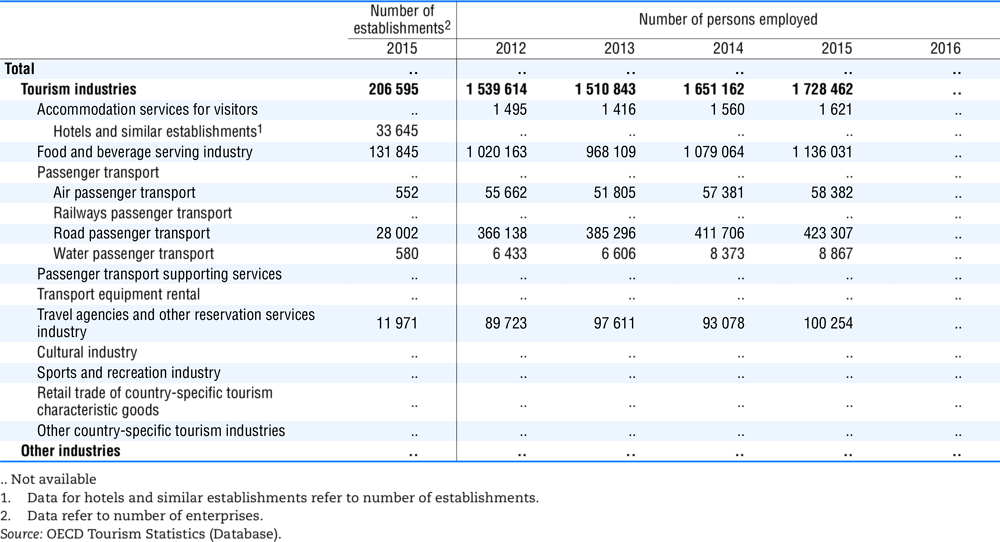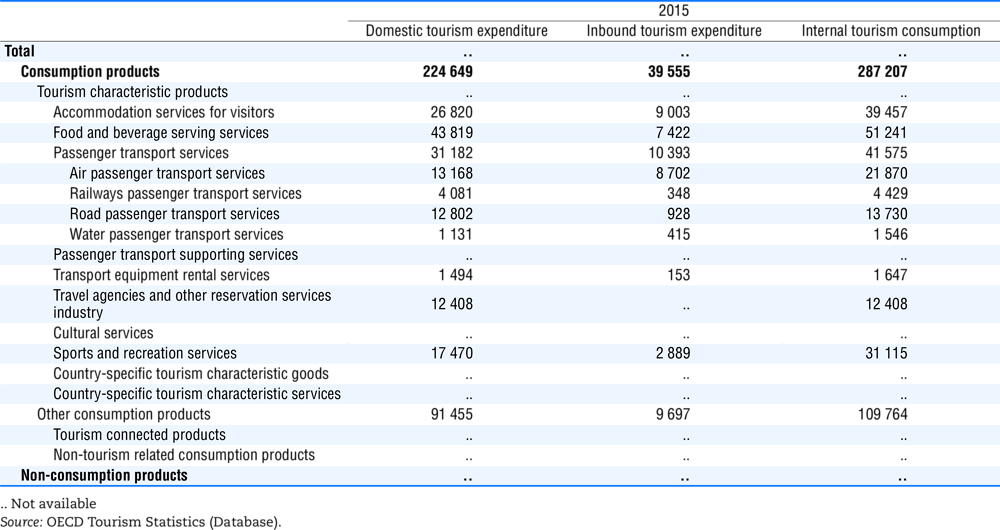Germany
Tourism in the economy
The growing tourism sector in Germany generates over EUR 105 billion in gross value added, equivalent to 3.9% of total GVA. Indirect effects are estimated to account for an additional EUR 76.1 billion. Over 2.9 million workers are directly employed in the tourism industry, equivalent to 6.8% of total employment.
International tourism receipts accounted for 3% of total exports in 2015. 80.8 million international visitors stayed overnight in Germany in 2016, an increase of 1.4% on 2015. The three main source markets are the Netherlands, Switzerland and the United States.
In 2016, there were 447.2 million overnight stays in accommodation facilities with ten beds or more (including camping), up 2.5% on the previous year. Domestic tourism accounts for 82% of these stays. Visitor spending exceeded EUR 287 billion in 2015, with EUR 224.6 billion (78%) of tourism revenue arising from domestic tourism, whereas visitors from abroad spent EUR 39.6 billion (14%).
Tourism governance and funding
The Federal Government is primarily responsible for establishing an appropriate policy environment for tourism, with the 16 Federal States (Länder) developing, shaping and promoting tourism policy. The Federal Länder-Committee on Tourism meets twice a year, fostering the exchange of information and coordination of measures involving two or more of the Länder.
The Federal Minister for Economic Affairs and Energy (BMWi) has lead responsibility for tourism policy. The Federal Government’s Commissioner for the New Federal States (Länder), SMEs and Tourism serves as the government’s central point of contact within the Federal Government and with the German Parliament (Bundestag), especially with the Parliamentary Tourism Committee. The Federal Minister for Economic Affairs and Energy is supported by the Advisory Council on Tourism Issues, which brings together the interests of government, commerce, academia, trade unions and others.
The Länder ministries responsible for tourism devise, implement and fund policies to promote tourism development. Local tourism offices coordinate the work of small, local enterprises, promote product design and undertake relevant marketing activities. Each of the Länder has a tourism association representing the interests of regional and local/municipal organisations and/or a destination marketing organisation.
The German National Tourist Board (GNTB) is responsible for the marketing of Germany overseas. GNTB works closely with the tourism marketing organisations of the Länder and co-operates across the world with the German Chambers of Commerce Abroad, the German foreign missions, Germany Trade & Invest (Federal economic development agency), as well as the Federal cultural institutes (Goethe Institut).

Source: OECD, adapted from the Federal Ministry for Economic Affairs and Energy, 2018.
Budgetary funds available to BMWi for tourism are concentrated in two main areas:
-
Institutional support for the GNTB. Since 2015, this has increased by EUR 1.6 million to around EUR 30.6 million a year, with the additional funds channelled inter alia into strengthening activities to target emerging source markets in Asia, particularly China, India and Arab Gulf States, as well as establishing new DZT agencies in locations well placed for additional source markets.
-
Promotion of projects to enhance the performance of tourism, amounting to EUR 1.6 million in 2017.
The Joint Federal Government-Länder Scheme for Improving Regional Economic Structure (GRW) is the central instrument of the Federal Government’s regional policy. The GRW project funding is provided through investments in trade and industry, including the tourism economy, and municipal investments in economic infrastructure, including basic infrastructure for tourism. The average portion of the GRW budget set aside for investment in the tourism industry and tourism infrastructure has been 14% over the past five years, an annual average of EUR 167 million (divided evenly between federal and Länder contributions). Other federal ministries fund measures and projects in their respective policy fields which benefit tourism in Germany.
Finance for tourism at municipal, regional, and Länder level derives from a range of different sources. In addition to public funds, revenue is generated from spa and tourism taxes, as well as from bed taxes.
Tourism policies and programmes
The focus is on supporting small and medium-sized enterprises (SMEs) in the tourism industry so that they can develop their competitive position and realise their potential for growth and employment.
Competition for skilled professionals has intensified across the entire economy and is impacting the continued development of tourism. The tourism industry reports declining numbers of trainees, comparatively high drop-out rates, and high staff turnover levels. It is a challenge to make the industry attractive to the next generation.
The German government’s tourism policy focuses not only on economic goals, but also on social and structural aspects. One of the biggest challenges is to enable the rural regions, especially economically weak regions, to reap greater benefits from tourism and to provide opportunities for rural enterprises to benefit from the growing tourism sector. Through strengthening local retail demand and using public facilities, tourists help to maintain local infrastructure and income in rural areas, and contribute to the development of entire regions.
Cultural tourism is a hallmark of tourism in Germany and many cultural destinations, mainly cities, attract tourists based on their museums, theatres, castles and palaces. Yet there is untapped potential in more remote regions, where traditions and customs provide variety in travel experiences.
BMWi is taking a fresh approach with its project The Destination as a Stage: How can Cultural Tourism Make Rural Areas Successful?. Five rural regions, each with a different level of tourism sophistication, are being coached to function as role models for other regions by demonstrating the benefits of the connection between culture and tourism, inspiring other destinations to develop their own initiatives. This work will continue into 2018.
Accessibility for all remains a tourism policy priority in Germany, including the provision of comprehensive and reliable information concerning barrier-free offers along the tourism service chain for people with disabilities. The “Tourism for All” project is funded by BMWi to support the creation of a nation-wide labelling and certification system (Box 1.17).
Digitisation is an increasingly important issue and smaller businesses especially are struggling to keep up. BMWi is conducting a study on the role of the sharing economy, analysing the market for sharing business models and their macroeconomic effects. The study will consider the need for regulatory action for private accommodation booking platform, with final results available in the first half of 2018.
In addition to a broad approach to sustainability, measures are in place with a strong focus on environmental sustainability. As part of a project on energy-efficient buildings conducted by BMWi in co-operation with the German Energy Agency (dena), the Check-in Energy Efficiency pilot project was initiated in 2015 to demonstrate an economic, ecological and socially acceptable strategy for hotels and hostels of the future. 30 participating hotels and hostels have been given expert energy-efficiency advice.
A German Tourist Association research project has produced guidelines for tourism destinations wishing to become increasingly sustainable. Sustainable tourism concepts protect the environment and nature while at the same time securing an economic future in their regions, ensuring quality of life and establishing identity. In order to attract more attention to sustainability in the tourism sector, a national competition was launched for the most sustainable tourism destination in Germany, based on 40 ecological, economic, social and management-related criteria. The Swabian Alb Biosphere Reserve was declared the winner in 2017, with further awards in specific categories. Finalists were rewarded through their inclusion in a national advertising campaign at train stations.



